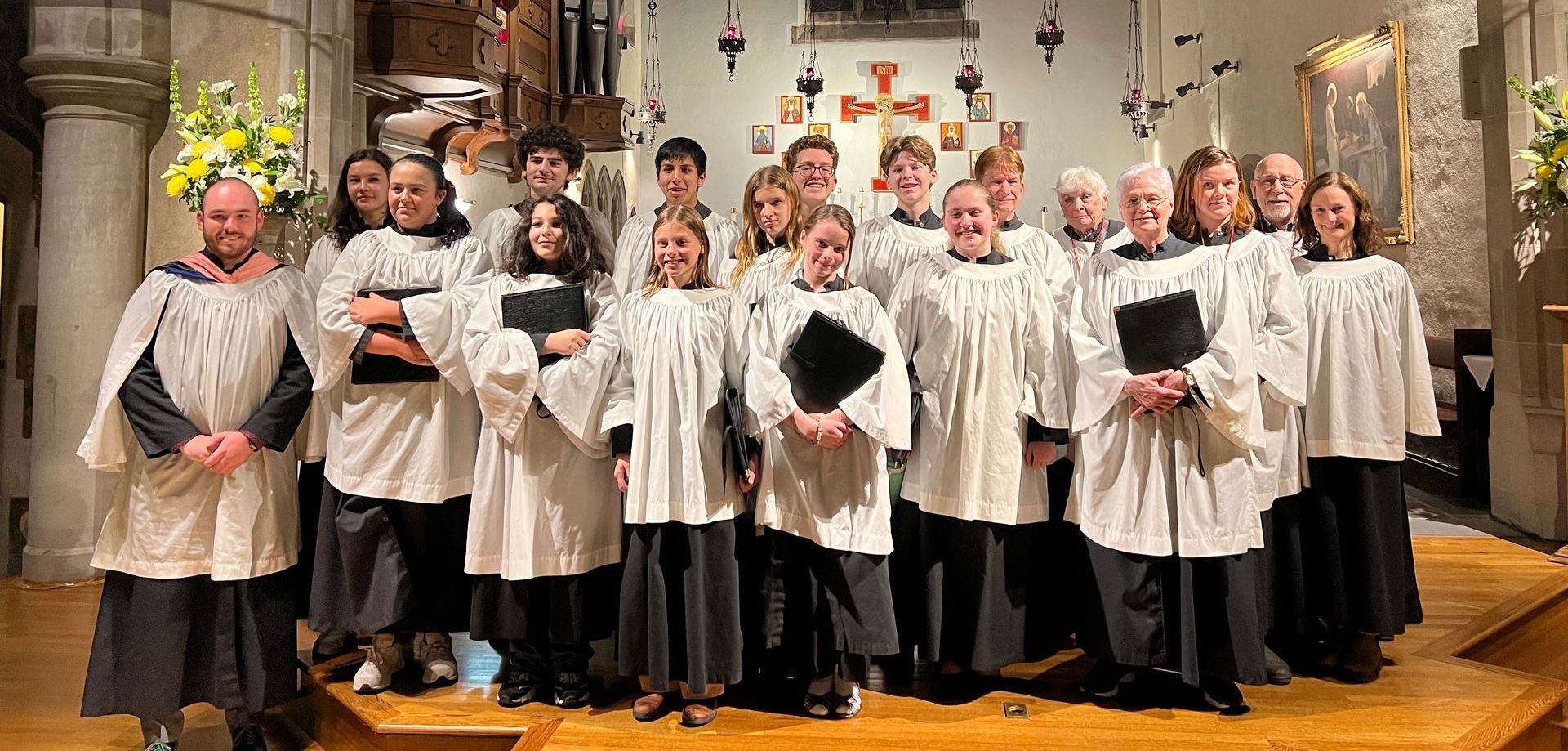Celebrating MLK Jr 2024
Celebrating Martin Luther King Jr. Day at St. Paul's
Each January, in more recent vintage, we mark Martin Luther King Day at St. Paul’s on the Sunday prior to the Monday holiday. But what does it really mean to us as a faith community? Is it just another holiday, one that some still feel is unnecessary, or does it hold true meaning for those of us celebrating it in some small way?
Beyond his work for human rights and civil rights in this country the Reverend Dr. Martin King Jr. was a man of faith who believed deeply in the concept of “Beloved Community,” which he saw as a global vision in which “all people can share in the wealth of the earth.” In his vision of Beloved Community, “poverty, hunger and homelessness will not be tolerated because international standards of human decency will not allow it. Racism and all forms of discrimination, bigotry and prejudice will be replaced by an all-inclusive spirit of sisterhood and brotherhood…..and international disputes will be resolved by peaceful conflict-resolution and reconciliation of adversaries, instead of military power.”
Utopian? Perhaps but Dr. King did not believe that to achieve this would happen without conflict and confrontation. However, he was firm in his conviction that conflict and confrontation could be resolved peacefully and most importantly that
adversaries could reconcile through a mutual commitment to nonviolence.
It therefore seems fitting that this year, the King Centre in Atlanta, established in 1968 by Mrs. Coretta Scott King as a living memorial to the causes for which Dr. King lived and died, chose the theme for the 2025 celebration as “Mission Possible: Protecting Freedom, Justice, and Democracy in the Spirit of Nonviolence365.” In Atlanta the Centre organizes a number of unique global learning opportunities for anyone interested in learning about Nonviolence365 and how it can work both at the community and individual level.
But what does this theme mean to us in Norwalk and how do we protect freedom, justice and democracy in the spirit of Nonviloence365? Well, we at St. Paul’s will have the opportunity to learn more about Nonviolence and what it means in our lives today. On Martin Luther King Sunday, January 18, we will have the opportunity to explore this theme with our guest preacher, the
Reverend Dr. Lindsay Curtis. He is the Pastor of Grace Baptist Church in Norwalk and is well placed to lead our discussion because of the roles he has played and continues to play in this community. Pastor Curtis serves as a Commissioner on the Judicial
Selection Commission, State of Connecticut; is a Chaplin to the Norwalk Fire Department, and Chairman of the Advisory Board of Directors for Norwalk ACTS, a diverse partnership of over 100 civic leaders, educators and organizations striving for a better education for all children of Norwalk. He is also a Board Member of the Urban League of Southern CT. and a Past-President of the
Norwalk Branch of the NAACP and a well-known Advocate for Equity and Fairness in Educational Funding, having testified numerous time before various Legislative Committees. We look forward to his visit with us and what he will bring to the table.
As we prepare to mark this 41st anniversary let’s think of some of the things that Dr. King defined as forms of violence that he hoped Nonviolence would address. Three of those which he described as “triple evils,” and barriers to our living in Beloved Community are poverty, racism and militarism - all three of which still exist today. The King Centre puts a modern definition on these three threats to
protecting freedom, justice and democracy in the spirit of Nonviolence365 describing them in this way:
POVERTY- defined as unemployment, homelessness, hunger, malnutrition, illiteracy, infant mortality, slums.
RACISM- described as prejudice, apartheid, ethnic conflict, anti-Semitism, sexism, colonialism, homophobia, ageism, discrimination against disabled groups, stereotypes.
MILITARISM which includes – war, imperialism, domestic violence, rape, terrorism, human trafficking, media violence, drugs, child abuse, violent crime.
So how do we combat these evils?
Well, there is a lot we can do and Dr. King recommends six steps for best practices on the road to adopting nonviolence as your personal philosophy:
1. Gather information: learn as much as you can about the problems around you and talk to those directly impacted.
2. Educate others: it is your duty to help those around you better understand the problems in society.
3. Remain committed: knowing you will face obstacles and blowback, work to inspire others.
4. Peacefully negotiate: talk to both sides, use humor, grace, and intelligence to foster solutions between the oppressed and the oppressors.
5. Take action peacefully: rely on peaceful demonstrations, letter-writing, and civil disobedience.
6. Reconcile: keep all actions peaceful and constructive.
So let this year be the anniversary where we look at what we each can do to mark this anniversary and keep the dream of attaining Beloved Community alive and sustainable.
As we move forward as Americans, we face great challenges. Our fellow countrymen are hurting, our systems are broken, and there is despair all around us.
We are in need of spiritual giants and strong leaders. May we rise up to follow in King’s footsteps and continue the work he began.
You might also like

Music at St. Paul's Choirs Adult volunteers and the St. Paul’s Choristers and Choral Scholars come together to lead the hymns and anthems at worship each Sunday. The choirs also participate in concerts, special services such as Evensong, and other events throughout the year. The Compline Choir (separate upper and lower voices choirs) sings chant and polyphony every Sunday night for the 8 PM service of Compline. St. Paul’s maintains a roster of professional singers that are called to sing special services throughout the year. St. Paul’s believes deeply in the power of congregational singing, and so our choir’s primary responsibility is to lead and inspire congregational song. Though we use the Hymnal 1982 as our primary musical resource, we frequently draw from other sources as well. Organ Our 1928 E.M. Skinner organ was installed and enlarged in 1992, and was restored and enlarged in 2007 by the Reuter Organ Company of Lawrence, Kansas. Seasonal recitals featuring talented organists are offered during the year. Visit the Events Calendar for updates. Read more, and see the organ’s specifications. St. Paul’s Chorister Program The St. Paul’s Chorister Program, is open to all children in grades 2 – 8. The Choristers meet weekly to rehearse and sing with the Schola Choir bi-monthly at the 11 am service. Rehearsals incorporate supplemental music education and fun! The program is free to all students and you do not need to be a member of St. Paul’s (or any church!) to participate. St. Paul’s Choral Scholars Program The Choristers are supported by Choral Scholars, high school aged students who often are pursuing musical careers of their own. This program offers an exposure to a wide variety of choral repertoire, and develops skills in sight reading and leadership. A honorarium is available to Scholars. If you would like more information about music and arts programs at St. Paul’s or would be interested in joining the choir contact Josh Ehlebracht at music@stpaulsnorwalk.org .

St. Paul's Juneteenth Celebration has become a major event in the life of the Parish. This year's event will feature a Pot Luck, fun & games and a Gospel Choir - You may even learn a thing or two! Mark your calendar for June 15, at 12:30 and dust off those recipes for the "Food of our Father's" pot luck lunch! June 19th is the day in 1865 in Galveston, Texas when a Union general rode in to inform the city that the institution of slavery had ended and that all enslaved people were from that moment, free. This should not have been a surprise to the enslaved African Americans of Texas since President Lincoln had in fact already issued a proclamation two years earlier, on Jan 1, 1863 liberating all enslaved persons living in Confederate states. But the order carried little weight in Texas, where there were few Union soldiers to enforce it, and where, according to Annette Gordon-Reed in her book “On Juneteenth,” despite the formal surrender of the Confederate General Robert E. Lee two months earlier, the Confederate army continued fighting until mid -May. Many of the enslaved persons in that state therefore continued working for their enslavers, but others we are told by Annette Gordon-Reed “knew the gist of the general order prior to June 19, as Galveston, the largest city in Texas was a port city through which most of the cotton picked and processed in the state was shipped out to the world.” And she stresses, “port cities are prefect vehicles for transmission of information to people of all degrees of literacy.” Ms. Gordon-Reed herself a Texan says: “Two days before General Granger arrived on the island, Black men working on the wharves began to shout in exultation. When asked what they were celebrating, they replied, because they were free.” The news began to spread to other towns but the enslaved had to be careful about openly celebrating as “White in Texas were incensed by what had transpired so much so that some reacted violently to the Blacks’ display of joy at emancipation.” Nevertheless, once the announcement was made in 1865 African Americans in Texas and elsewhere in the United States as the cultural practice spread began to celebrate the day. But though acknowledged by some 47 states and the district of Columbia it is only in 2021 that Juneteenth was made a federal holiday in the United States commemorating the emancipation of enslaved African Americans.


